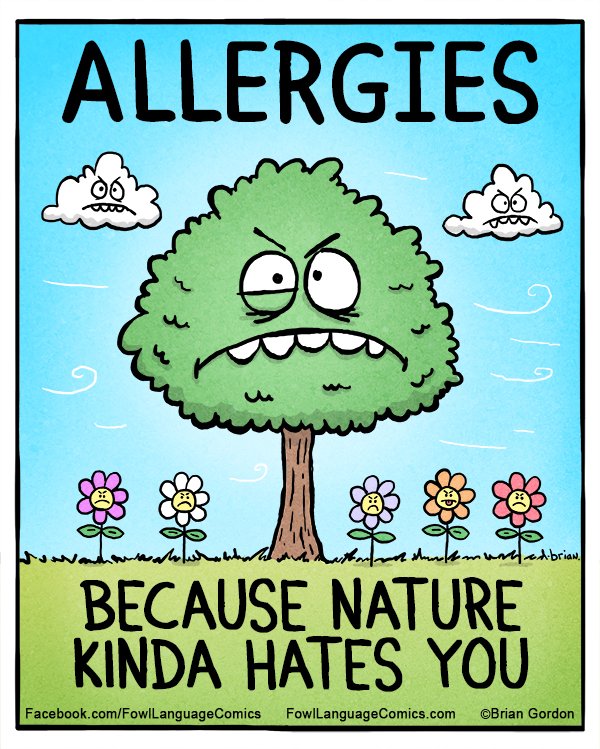We've all had that moment in the year between winter and I'm not talking about the happiness involved knowing that summer is almost near. Im talking about allergies.... yes allergies they are the worst. Never-mind the sneezing in class but when other people around you have the same thing and you dont than you got a problem. Imagine this you sitting in class and the kid behind keeps sneezing at some point it becomes annoying not only for him but for everyone else to.... I mean why are allergies so annoying to everyone? what actually happens to you?

Checkout these videos for the science, tips and allergies
Downvoting a post can decrease pending rewards and make it less visible. Common reasons:
Submit
lol funny
Downvoting a post can decrease pending rewards and make it less visible. Common reasons:
Submit
true story :D
Downvoting a post can decrease pending rewards and make it less visible. Common reasons:
Submit
Allergies, also known as allergic diseases, are a number of conditions caused by hypersensitivity of the immune system to something in the environment that usually causes little or no problem in most people. These diseases include hay fever, food allergies, atopic dermatitis, allergic asthma, and anaphylaxis. Symptoms may include red eyes, an itchy rash, sneezing, a runny nose, shortness of breath, or swelling. Food intolerances and food poisoning are separate conditions.
Common allergens include pollen and certain food. Metals and other substances may also cause problems. Food, insect stings, and medications are common causes of severe reactions.[3] Their development is due to both genetic and environmental factors. The underlying mechanism involves immunoglobulin E antibodies (IgE), part of the body's immune system, binding to an allergen and then to a receptor on mast cells or basophils where it triggers the release of inflammatory chemicals such as histamine. Diagnosis is typically based on a person's medical history. Further testing of the skin or blood may be useful in certain cases. Positive tests, however, may not mean there is a significant allergy to the substance in question.
Early exposure to potential allergens may be protective. Treatments for allergies include avoiding known allergens and the use of medications such as steroids and antihistamines. In severe reactions injectable adrenaline (epinephrine) is recommended. Allergen immunotherapy, which gradually exposes people to larger and larger amounts of allergen, is useful for some types of allergies such as hay fever and reactions to insect bites. Its use in food allergies is unclear.
Allergies are common. In the developed world, about 20% of people are affected by allergic rhinitis, about 6% of people have at least one food allergy, and about 20% have atopic dermatitis at some point in time. Depending on the country about 1–18% of people have asthma. Anaphylaxis occurs in between 0.05–2% of people. Rates of many allergic diseases appear to be increasing. The word "allergy" was first used by Clemens von Pirquet in 1906.
Downvoting a post can decrease pending rewards and make it less visible. Common reasons:
Submit
very informative video...
thanks for sharing it...
upvoted...!!!!
Downvoting a post can decrease pending rewards and make it less visible. Common reasons:
Submit